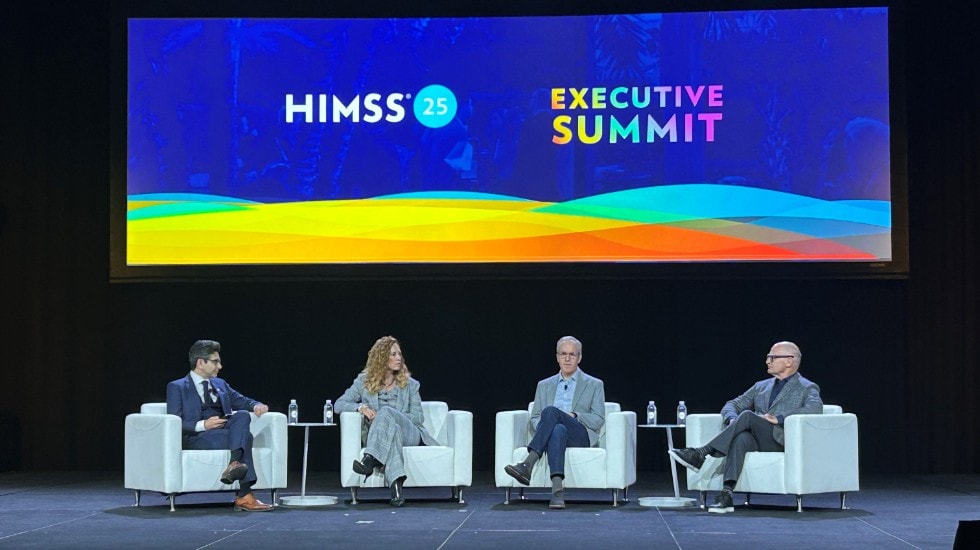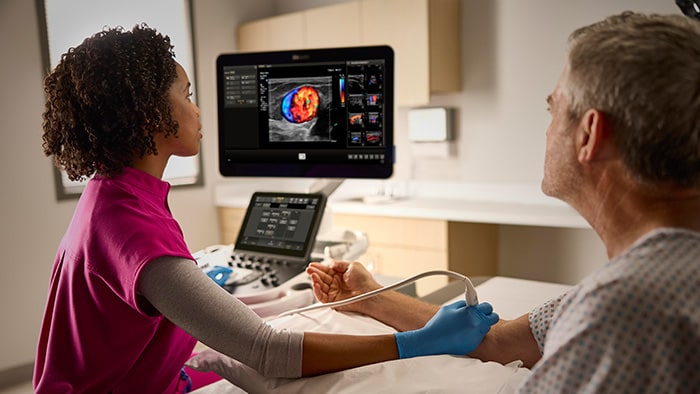Managing the tsunami of data and adopting AI technology to create precision care
How the integration of data and AI can help provide better care for more people
Jun 02, 2025 | 5 minute read
In the constantly evolving landscape of healthcare IT, the last decade has seen healthcare organizations digitizing almost everything possible, leading to a tsunami of data. Health systems are asking how the integration of holistic data gathered across the enterprise and the implementation of AI solutions will help us provide better care for more people.

To address this question, Shez Partovi, Chief Innovation Officer and Chief Business Leader, Healthcare Informatics at Philips, convened a panel of industry experts at the 2025 Healthcare Information and Management Systems Society Global Health Conference & Exhibition (HIMSS25, Las Vegas, USA). The experts included Terri Couts, RN-BC MHA, SVP, and Chief Digital Officer at The Guthrie Clinic, Curt Langlotz, MD, Professor of Radiology, Medicine and Biomedical Science at Stanford Medicine, and Senior Associate Vice Provost for Research at Stanford University, and Tim Zoph, CHCIO, Senior Advisor McKinsey & Company – who discussed the opportunities and challenges of adopting AI and holistic data approaches to create a more precise, responsive, and patient-centric healthcare system.
Watch the condensed 5 minute video version of this discussion: HIMSS 2025 Health Conference - Philips
Managing the tsunami of data to create precision care delivery
What is precision care? Healthcare leaders say it's a disruptive idea that means getting out of reactive medicine into more proactive medicine by developing treatments and therapies that prevent or mitigate a disease. This approach also emphasizes the importance of early disease diagnosis, allowing for timely interventions and potentially better patient outcomes. McKinsey's Tim Zoph: "The model of care we have now does not work; it won't get us from here to there. Precision care will mean that we get ahead of the disease and create the ability to monitor patients when they're asymptomatic but at risk. This is a very disruptive notion, a true inflection point. We would use data to put molecular markers out there and be able to inform the patient that, at this point in your journey, this medication or behavioral change might work for you."
The potential benefits of precision care are vast, particularly in improving patient outcomes and diagnostic accuracy, ideally making medical practices safer and more effective. To do this, these leaders say to start by clarifying the clinical problem you're trying to solve, addressing the barriers to access, and then partnering to build AI models you can test and monitor, for example, with cancer care.
Curt Langlotz: "We're getting to a place with cancer where we can get a much better read on what that patient's cancer is including how that patient might respond to therapies based on genetics and imaging. That's very different from how we looked at cancer in the past."
Leveraging AI in healthcare
By definition, AI has the potential to revolutionize health care delivery by enhancing the accuracy and efficiency of diagnosis, treatment, and patient care. AI algorithms can analyze vast amounts of medical data, identify patterns, and make predictions that inform clinical decision-making, ultimately improving patient outcomes. AI also plays a crucial role in personalized medicine. By analyzing a patient’s genetic profile, medical history, and lifestyle, AI algorithms can identify the most effective treatment options tailored to the individual. Additionally, AI-powered chatbots can provide patients with personalized health advice and support, enhancing their overall well-being and engagement in their care.
On the successful implementation of AI-driven solutions in the real-world
Participants stressed that the real-world use of AI-driven solutions must look at the data in real-time no matter where the patient is on their care journey, and then drive the care to them where they need it, ensuring timely care by getting the proper care at the right time and location. Terri Couts: "In the command center, which we use for care coordination, we're using data to say this patient is more likely to go home today if the imaging study is read at a certain time. The data also shows that this patient will likely be accepted for a hospital-at-home program. We're driving the type of care they need when they need it versus the standard model, where if you're not ready for that discharge order, you don't get it until the next day. It's analytics to drive collaborative care for every patient, every time."
The impact of AI on patient care and operations
We have a lot of data; the question is, can health care providers use it to power new AI models? When we do, Shez Partovi asks, how can a health system determine AI's ROI? Terri Couts: "When we talk about the ROI of AI, we're asking if it is going to improve operational efficiency. Will it address clinician burnout? Because if we can retain and engage our workforce – that pays for itself."
Partnerships are paramount
Tim Zoph: "There should be a warning label on precision health: Don't do this alone! To develop algorithms, we must partner with patients to have deeper data, with hyperscalers to help us amass all this biomedical data and more. We should ask, what capabilities will I need in a partner?" Terri Couts: "We can barely recruit enough nurses and physicians to practice. A partner is necessary for a healthcare system like mine. We choose partners who are okay with us contributing to the data, and we're training on our data. A true partnership is where you can develop the model together. Then, who owns it and is accountable? IT plays a role, but really it's the clinicians who need to own and monitor the use."
No access, no precision
The panel agreed that without access to care, you can’t talk about precision medicine. According to the American College of Cardiology [1], nearly half of US counties don’t have a cardiologist anymore, so we clearly need a new model. To provide better care for more people, precision medicine needs a new toolkit of AI models and partnerships that provide ROI through improved operations and proactive, predictive patient care.
What the latest data tells us
When moving from sick care to health care, clinicians believe AI has the potential to be transformative. According to brand-new data just released in the Philips 2025 Future Health Index global report, 82% of healthcare professionals believe AI and predictive analytics could save lives by enabling earlier interventions, and 75% agree digital health technologies including AI and predictive analytics will reduce hospital admissions in the future. The report is based on responses collected between December 2024 and April 2025 from 16,000 patients and nearly 2,000 clinicians across 16 countries. The study found that clinicians are the most trusted source of information on AI in healthcare for patients. If AI is going to scale in healthcare, clinicians must lead the conversation and be supported to do so. The bottom line is that clinicians aren’t just end-users of AI. They are the gatekeepers, validators and champions of its trusted use in care.
Sources [1] (No Practicing Cardiologist in Nearly Half of US Counties, Despite Higher CV, Mortality Risk - American College of Cardiology, 2024)








